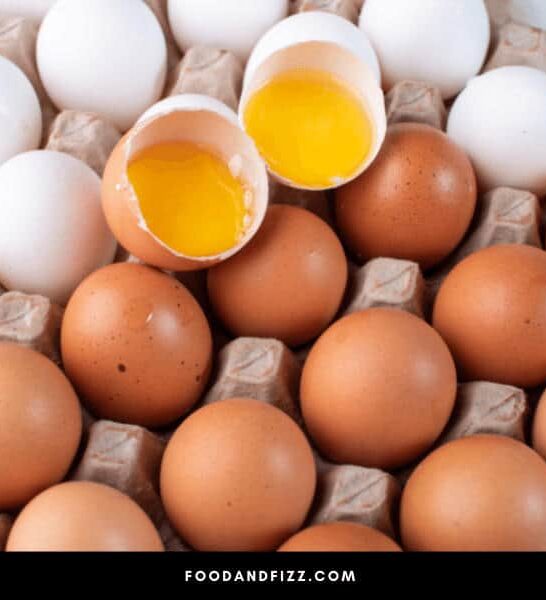Eggs are a staple breakfast food and are well-loved the world over not just because of their taste and versatility in cooking, but also for their touted superior nutritional benefits.
Because most of us get our eggs from supermarkets and grocery stores, it can be easy to forget where they come from. If you get yours from a farm or have access to your own eggs though, you won’t easily forget that eggs come from chickens, and are laid by hens regularly. Chicks also hatch from these eggs.
So, if hens lay eggs, and chicks are hatched from eggs, does it mean that it is possible to have 12 baby chicks in one carton of eggs from the grocery?
Well, not exactly. Store-bought eggs usually do not hatch chicks.
Why don’t store-bought eggs hatch? The reasons are given below.
Why Don’t Eggs Hatch?
Store-bought eggs don’t hatch because they are not fertilized. Most farms have female-only chickens which means that there is no chance for the eggs to be fertilized, and it is unlikely that your egg carton will ever hatch a dozen chicks. For eggs sourced from farms with male chickens, there is a possibility of a fertilized egg making its way into the egg supply. For the most part, though, eggs that are sold commercially are made up of unfertilized eggs.
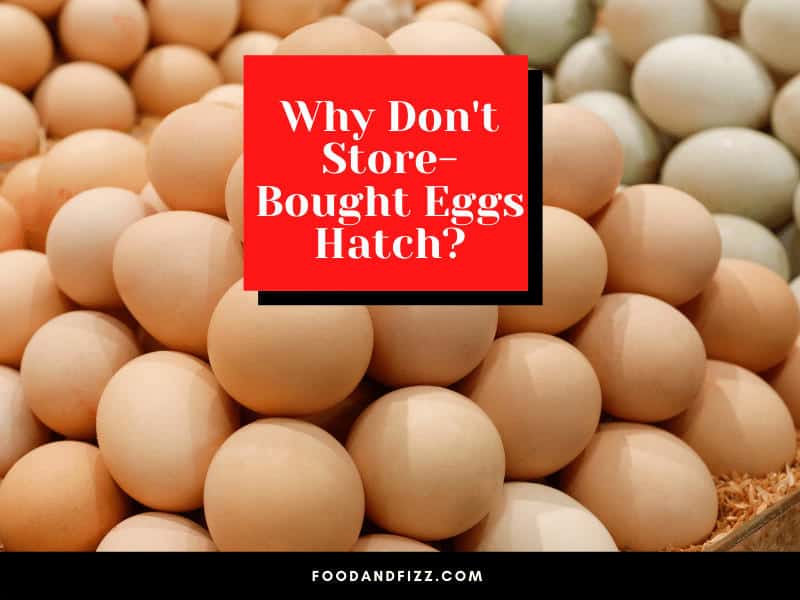
Why Do Chickens Lay Eggs?
Chickens, like all other animals, naturally want to produce offspring to protect and propagate their species. They do this by laying eggs.
As with other species including humans, the eggs need to be fertilized by a male in order to produce offspring. Without fertilization, there won’t be a baby chicken inside the egg, but the egg will still be released by the mother.
Other species nurture and nourish their offspring inside the mother’s body, but chickens and birds do not – they do this outside their body as an evolutionary means of protection, as most birds are often prey for other animals.
All the nutrients needed to nourish a baby chicken, in case it is fertilized, is contained within the egg. This is the main reason why eggs are super nutritious even for us.

How Often Do Chickens Lay Eggs?
A mother hen would instinctively keep laying eggs to form what’s called a “clutch”. A clutch is a group of eggs, or potential baby chicks, that a mother chicken will nurture.
The count is usually a dozen for chickens, but it depends on the breed and the conditions. A phenomenon that has been observed with this is, that if you keep taking the eggs away, the mother hen will keep laying eggs to complete this clutch.
The way a chicken’s reproductive system works is, that they will ovulate and lay an egg about once per day, although skipping days is not uncommon. Chickens would also normally have a period where they don’t lay any eggs, which is a built-in instinct that protects potential offspring from harsh conditions, such as when they produce offspring in the winter.
However, nowadays, chicken breeds have been altered enough especially in that industry, that this instinct has been suppressed. Chickens now will keep laying eggs all year round.
How Likely Is It That I Am Consuming a Fertilized Egg?
It is highly unlikely that you would be consuming a fertilized egg if you bought your eggs from the grocery store, for the following reasons.
1. Suppliers
Commercial egg suppliers would usually only have female chickens in their facilities. No rooster in the facility means that there is no chance that the eggs the hens lay will be fertilized.
2. Inspection
Eggs are usually inspected before being cleared to be sold. If it is a fertilized egg and there is a growing chick inside it, it would likely be caught in the inspection and never make it to the store.
3. Storage
Eggs for commercial selling are usually required to be stored in refrigeration, which is not an ideal condition for a growing embryo.
Based on those reasons, it is highly unlikely that a fertilized egg would ever make it into your home. However, if one does go through, and it happens to be in your egg carton, it poses no danger to you.
Even if the eggs are unrefrigerated though, this is an unlikely scenario.
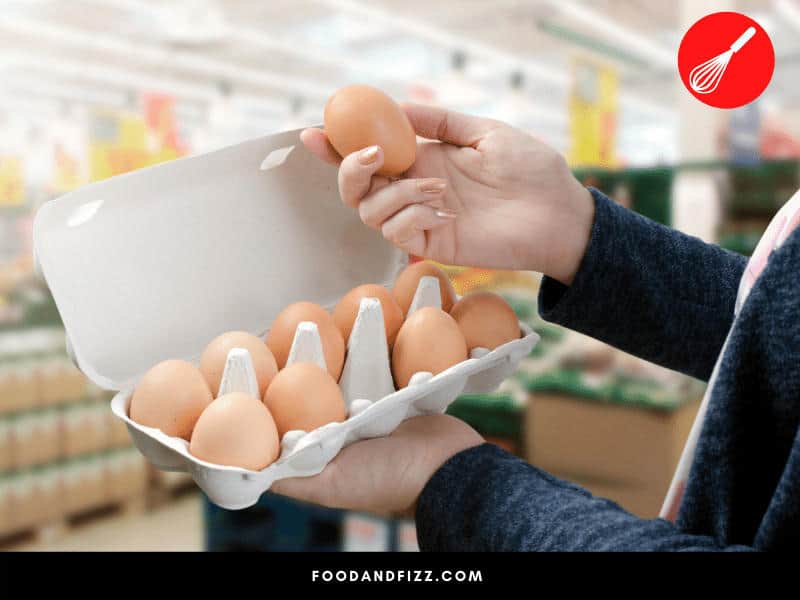
What Are the Health Risks of Eating A Fertilized Egg?
Fertilized eggs are perfectly safe to eat. In fact, in terms of nutrition and taste, they are the same. Eating a fertilized egg is the same as eating an unfertilized egg. It will not significantly alter the taste of your recipes, and they pose no health risk to you.
How To Tell If An Egg is Fertilized
So, you got your eggs from someone who has hens and roosters, and you want to be sure whether the eggs you have are fertilized or not.
You can tell if an egg is fertilized by doing the following things:
1. Cracking the egg open and examining the yolk
A fertilized egg would have a tiny donut-like shaped white spot with a clear center in the yolk. This spot is what is called a germinal disc. An unfertilized egg would have this too, but instead of clear in the middle of the spot, it would just be a solid white spot, indicating that no male chicken has fertilized it.
2. Candling the egg
This means holding the egg up against a light source like a flashlight or a candle to check for the development of the embryo inside (the presence of blood vessels, etc.), several days after incubation. Eggs that are cloudy are likely fertile, but without incubation, these won’t necessarily turn into chicks. Incubation is an important factor in this process.
As mentioned though, it is highly unlikely that you would ever be consuming fertilized eggs by accident. But just in case you do, they would not pose any health risks.
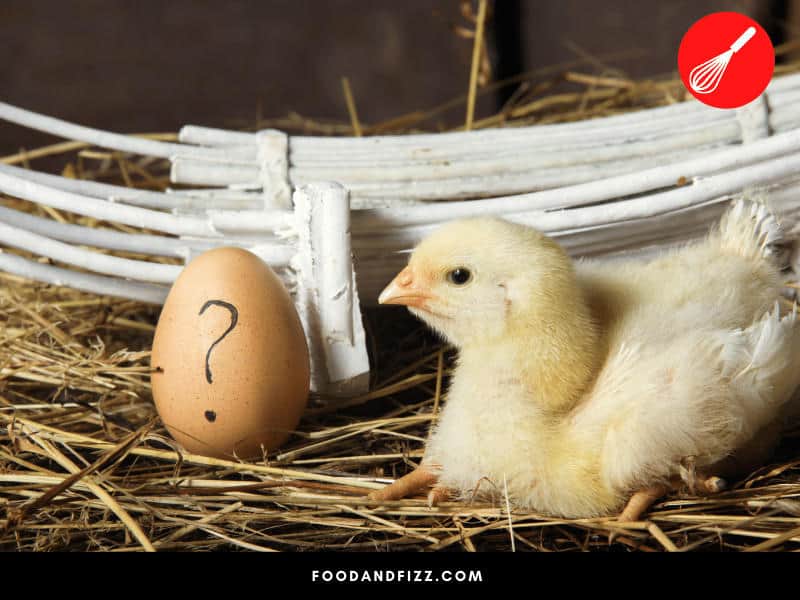
What are the Health Benefits of Eggs?
Eggs are considered to be a highly nutritious superfood that are a good source of vitamins, minerals, and high-quality protein, as well as a helpful aid in eye and heart health.
They also increase good cholesterol levels, help with cell functioning and contribute to healthy aging. They are a wonderful addition to any diet.
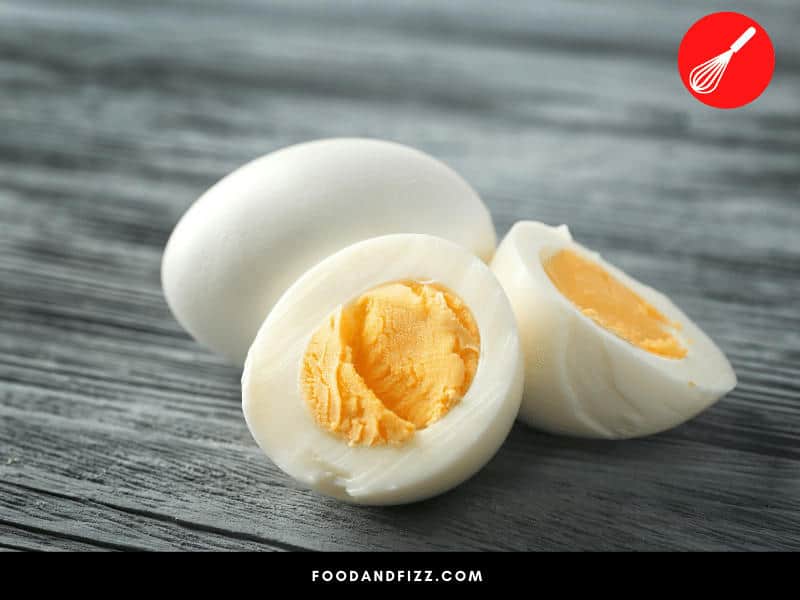
What Are the Uses of Eggs?
Eggs are loved not just for their nutritional benefits, but also for their many different uses in cooking. They are good eaten on their own, such as scrambled eggs, used as an emulsifier, leavening, or binding agent in baked goods, and as a texture-enhancer in other dishes.
From pasta to salad dressings, to custards, cupcakes, and frostings, eggs are truly one of the big superstars in the culinary world.
Are Eggs Safe to Eat?
Eggs are a wonderful addition to a healthy diet, but it also has to be prepared well for us to be able to reap its many benefits. As eggs come from chickens, they also potentially carry Salmonella, which can cause food-borne illnesses.
To decrease the chances of getting sick from eggs, make sure to do the following:
- Source from reputable suppliers to make sure that they properly refrigerate and follow strict sanitary procedures to make sure that your eggs are safe to eat.
- Make sure to always cook the eggs to at least 160°F (71°C)
- Keep eggs stored properly and refrigerated.
- Always practice proper hygiene when handling eggs.
- Consider using pasteurized eggs for dishes where you have to use raw or lightly cooked eggs, like hollandaise sauce.
- No matter how tempting, do not taste batters or doughs containing raw egg, as in cookie dough.
Conclusion to Why Don’t Eggs Hatch (Store-Bought)?
Store-bought eggs don’t hatch because most facilities that supply those eggs only keep female chickens, and there is no chance that their eggs will be fertilized as they have no exposure to a rooster.
Strict procedures and standards also ensure that eggs that are sold commercially are not fertilized, so it is not likely that one will ever find their way into your home. If they do, though, they pose no health risk, and will not alter your recipes in any way.
Frequently Asked Questions on Why Don’t Store-Bought Eggs Hatch?
Are fertilized and unfertilized eggs different taste-wise?
Fertilized and unfertilized eggs taste the same way and have no difference in texture and nutritional benefit.
Can you hatch chicks from supermarket eggs?
Because most commercially sold eggs are unfertilized, it would not be possible to hatch chicks from supermarket eggs.
Are all laid eggs fertilized eggs?
Not all laid eggs are fertilized eggs. Even without roosters, hens still lay eggs.

